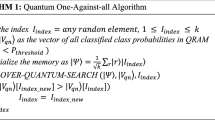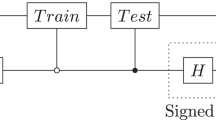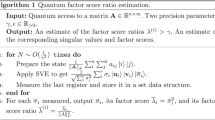Abstract
The support vector clustering algorithm is a well-known clustering algorithm based on support vector machines using Gaussian or polynomial kernels. The classical support vector clustering algorithm works well in general, but its performance degrades when applied on big data. In this paper, we have investigated the performance of support vector clustering algorithm implemented in a quantum paradigm for possible runtime improvements. We have developed and analyzed a quantum version of the support vector clustering algorithm. The proposed approach is based on the quantum support vector machine [1] and quantum kernels (i.e., Gaussian and polynomial). The classical support vector clustering algorithm converges in \( O\left( {M^{2} N} \right) \) runtime complexity, where M is the number of input objects and N is the dimension of the feature space. Our proposed quantum version converges in \( \sim O\left( {\log MN} \right) \) runtime complexity. The clustering identification phase with adjacency matrix exhibits \( O\left( {\sqrt {M^{3} lgM} } \right) \) runtime complexity in the quantum version, whereas the runtime complexity in the classical implementation is \( O\left( {M^{2} } \right) \). The proposed quantum version of the support vector clustering method demonstrates a significant speedup gain on the overall runtime complexity as compared to the classical counterpart.


Similar content being viewed by others
References
Bishwas, A.K., Mani, A., Palade, V.: An all-pair quantum SVM approach for big data multiclass classification. Quantum Inf. Process. 17, 282 (2018). https://doi.org/10.1007/s11128-018-2046-z
Lloyd, S, Mohseni, M., Rebentrost, P.: Quantum Algorithms for Supervised and Unsupervised Machine Learning, arXiv:1307.0411
MacKay, D. (2003) Chapter 20. An Example Inference Task: Clustering (PDF). Information Theory, Inference and Learning Algorithms. Cambridge University Press, pp. 284–292. ISBN 0-521-64298-1. MR 2012999
Ostrovsky, R., Rabani, Y., Schulman, L.J., Swamy, C. (2006). The effectiveness of Lloyd-type methods for the k-means problem. In: Proceedings of the 47th annual IEEE symposium on foundations of computer science (FOCS’06). IEEE, pp. 165–174
Bensaid, A.M., Hall, L.O., Bezdek, J.C., Clarke, L.P.: Partially Supervised Clustering for Image Segmentation Pattern Recognition. Elsevier, Amsterdam (1996). https://doi.org/10.1016/0031-3203(95)00120-4
Bishwas, A.K., Mani, A., Palade, V.: Quantum sequence clustering. In: Bhattacharyya, S., Mukherjee, A., Pan, I., Dutta, P., Bhaumik, A.K. (eds.) Hybrid Intelligent Techniques for Pattern Analysis and Understanding. CRC Press, New York (2017)
Ben-Hur, A., Horn, D., Siegelmann, H.T.: Support vector clustering. J. Mach. Res. 2, 125–137 (2001)
Sheng, Y.-B., Zhou, L.: Distributed secure quantum machine learning. Sci. Bull. 62(14), 1025–1029 (2017)
Duan, B., Yuan, J., Xu, J., Li, D.: Quantum algorithm and quantum circuit for A-optimal projection: dimensionality reduction. Phys. Rev. A 99, 032311 (2019)
Scholkopf, B., Platt, J., Shawe-Taylor, J., Smola, A., Williamson, R.: Estimating the support of a high-dimensional distribution. Neural Comput. 13(7), 1443–1471 (2001)
Scholkopf, B., Williamson, R., Smola, A., Shawe-Taylor, J., Platt, J.: Support vector method for novelty detection. In: Advances in Neural Information Processing Systems (NIPS), pp. 582–588 (2000)
Khan, S.S, Madden, M.G.: One-Class Classification: Taxonomy of Study and Review of Techniques, arXiv:1312.0049v1 (2013)
P. Rebentrost, M. Mohseni and S. Lloyd, arXiv:1307.0471v3
Bishwas, A.K., Mani, A., Palade, V.: arxiv.org/pdf/1711.01464
Suykens, J.A.K., Vandewalle, J.: Least squares support vector machine classifiers. Neural Process. Lett. 9(3), 293–300 (1999). https://doi.org/10.1023/A:1018628609742
Saunders, C., Gammerman, A., Vovk, V.: Ridge regression learning algorithm in dual variables. In: Proceedings of the 15th International Conference on Machine Learning, ICML-98, Madison-Wisconsin (1998)
Fletcher, R.: Pmctical Methods of Optimization. John Wdey and Sons, Chichester (1987)
Fletcher, R., Johnson, T.: On the stability of null-space methods for KKT systems. SIAM J. Matrix Anal. Appl. 18(4), 938–958 (1997)
Aly, M. (2005). Survey on multiclass classification methods (PDF). Technical Report, Caltech
Bishwas, A.K., Mani, A., Palade, V.: Big data classification with quantum multiclass SVM and quantum one-against-all approach. In: Conference Proceedings to IEEE 2nd International Conference on Contemporary Computing and Informatics (IC3I) (2016). https://doi.org/10.1109/ic3i.2016.7918805
Lloyd, S., Mohseni, M., Rebentrost, P.: arXiv:1307.0401 (2013)
Berry, D., Ahokas, G., Cleve, R., Sanders, B.: Efficient quantum algorithms for simulating sparse Hamiltonians. Commun. Math. Phys. 270, 359 (2007)
Harrow, A., Hassidim, A., Lloyd, S.: Quantum algorithm for linear systems of equations. Phys. Rev. Lett. 103, 150502 (2009)
Lloyd, S., Mohseni, M., Rebentrost, P.: arXiv:1307.0411 (2013)
Aaronson, S., Grier, D., Schaeffer, L.: The Classification of Reversible Bit Operations. arXiv:1504.05155 [quant-ph] (2015)
Bennett, C.H.: Logical reversibility of computation. IBM J. Res. Dev. 17, 525–532 (1973)
Giovannetti, V., Lloyd, S., Maccone, L.: Quantum random access memory. Phys. Rev. Lett. 100, 160501 (2008)
Furrow, B.: A panoply of quantum algorithms. J. Quantum Inf. Comput. ACM 8(8), 834–859 (2008)
Grover, L.: A fast quantum mechanical algorithm for database search. In: Proceedings of 28th Annual ACM Symposium on Theory of Computing (STOC), pp. 212–219 (1996)
Boyer, M., Brassard, G., Høyer, P., Tapp, A.: Tight bounds on quantum searching. Fortschr. Phys. 46(4–5), 493–505 (1998)
Buhrman, H., Cleve, R., de Wolf, R., Zalka, C.: Bounds for small-error and zero-error quantum algorithms. In: 40th IEEE Symposium on Foundations of Computer Science (FOCS), pp. 358–368 (1999)
https://qiskit.org/textbook/ch-algorithms/grover.html#3.1-Qiskit-Implementation-
Blomkvist Karlsson, V., Strömberg, P.: 4-qubit Grover’s algorithm implemented for the ibmqx5 architecture, http://www.diva-portal.org/smash/get/diva2:1214481/FULLTEXT01.pdf (2018)
Tax, D.M.J., Duin, R.P.W.: Support vector domain description. Pattern Recogn. Lett. 20, 1991–1999 (1999)
Author information
Authors and Affiliations
Corresponding author
Additional information
Publisher's Note
Springer Nature remains neutral with regard to jurisdictional claims in published maps and institutional affiliations.
Rights and permissions
About this article
Cite this article
Bishwas, A.K., Mani, A. & Palade, V. An investigation on support vector clustering for big data in quantum paradigm. Quantum Inf Process 19, 108 (2020). https://doi.org/10.1007/s11128-020-2606-x
Received:
Accepted:
Published:
DOI: https://doi.org/10.1007/s11128-020-2606-x




